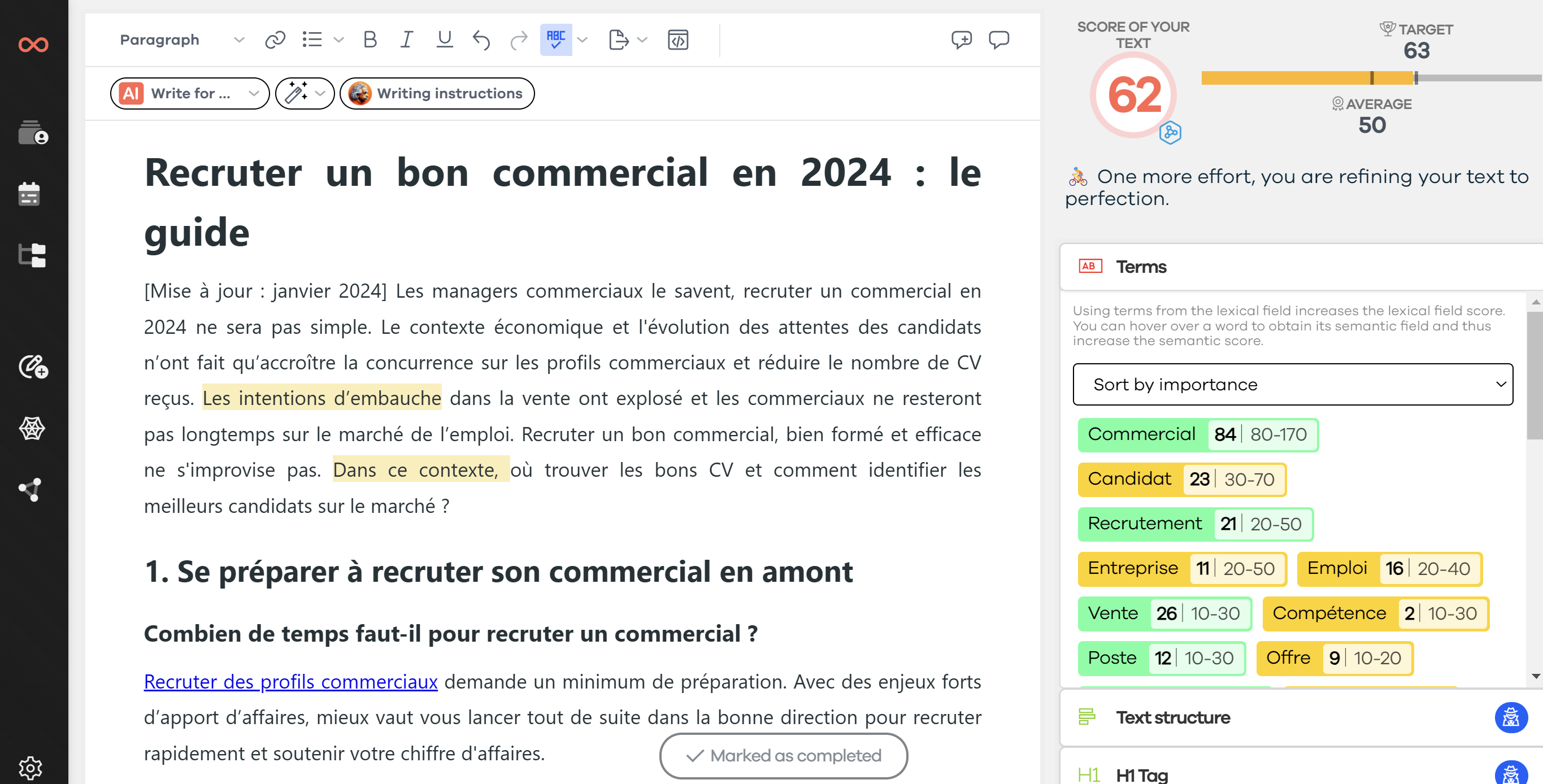Why is there so much talk about lexical fields when we want to rank a page well on Google? The fact is that search engines carefully analyze this data and readers need it to appreciate content. In this blog post, I explain everything you need to know about this crucial element of web copywriting and share with you my 4 methods for creating a high-performing SEO lexical field.
🚀 Express Reading: 2 minutes to understand SEO lexical fields
The use of a good lexical field is essential in SEO, as it helps search algorithms understand the subject of the texts you publish. Moreover, it makes your content more relevant and significantly improves readability. In this article, after giving you a definition of the lexical field and describing its importance in SEO, I invite you to discover my 4 techniques for finding the words that will please Google and the reader.

👨🏫 Definition of the lexical field
A lexical field corresponds to all groups of words and expressions that belong to the same theme. They can be of any kind (adjectives, nouns or verbs) and define a subject in its entirety. When associated, these terms reflect the entire theme addressed in a textual content (blog article, SEO text, literary writing, etc.).
Before writing an SEO text, you choose a keyword or main query. The lexical field will then revolve around this initial idea to fully reflect the essence of the subject. This technique is commonly used by writers, journalists, and web copywriters. It allows to cover the subject exhaustively and is crucial for the reader to be able to fully immerse themselves in the proposed universe.
To illustrate my point, I propose to take an example of an SEO lexical field. If I choose to write a post on the subject of fishing, I will integrate a whole family of words that illustrate this theme:
- fisherman;
- rod;
- fishing;
- hook;
- fish;
- water;
- etc.
🔎 What is the difference between the lexical field and the semantic field?

To optimize the natural referencing of your text, you have certainly already read (or heard) that you should develop lexical and semantic fields. At first glance, these concepts may seem very similar, even identical. However, even though they are complementary, these two ways of developing your vocabulary are absolutely distinct.
The semantic field is actually a precision of the words that are part of your lexical field. It allows to contextualize the information and to put into situation the terms used in your writings. Semantics is therefore used to give meaning to the lexical field in order to fully respond to the search intent of Internet users.
If I take up the lexical field of the subject of fishing, here is an example of an SEO semantic field that I should use in my sentences:
- fisherman: amateur, line, technique...;
- rod: line, lead, equipment...;
- fishing: shore, boat, leisure...;
- hook: line, bait, end...;
- fish: sea, freshwater, size...;
- water: river, lake, leisure...;
- etc.
Beware, however, not to blindly use automatic lexical field creation tools that do not take semantics into account. Indeed, when the chosen keyword is ambiguous (which is the case with the chosen example), these limited artificial intelligences can mislead by proposing off-topic lexical variants:
- tree;
- fruit tree;
- fruit;
- core;
- sweet;
- etc.
💥 The importance of the lexical field in SEO

You have already understood that the lexical field allows you to develop your key query and helps the reader to immerse themselves in the theme. But why is it so important in natural referencing? To know this, you need to know the basics of the history and operation of Google's algorithms.
In the beginning, search engines analyzed pages in a robotic way. They were not interested in the desires and needs of users and focused on the exact query. This method of analysis led to a "black hat" referencing technique that consisted of stuffing the text with the same keyword (keyword stuffing).
Realizing this flaw, Google updated its algorithms so that they could better understand the search intent and humanize the text control procedure online. As a result, enriching the vocabulary in SEO writing has become a widely recommended practice to improve organic referencing.
This evolution has thus made it possible to provide better results to Internet users and to improve the readability of the pages displayed in the SERP. That's why it's absolutely necessary to cover the subject in its entirety and to offer quality content to hope to appear on the first page of Google. Thus, developing the lexical field has become a must for anyone wishing to optimize their referencing.
The other great advantage of proposing an SEO lexical field is that you create an opportunity to position your page on associated queries. If I take up once again the example of our article on fishing, I can envisage that my content will also be displayed on the following Google searches:
- fishing technique;
- fishing equipment;
- fishing site;
- etc.
This will of course depend on the information I wish to present in my text. Indeed, this query is very general. It therefore seems impossible to position oneself on all the related themes. However, to achieve this, it would be interesting to create several contents using keyword clustering and long tails.
✔ 4 steps to create an effective SEO lexical field

To find all the words you need to prove to Google that your text is complete and relevant, you must follow a precise methodology. Personally, I use 4 ways to create a complete SEO lexical field.
1. Brainstorming
The first step is to spend about ten minutes listing all the words that come to mind when you think about your main subject. I like to group them in an Excel spreadsheet where I create a column for each sub-theme (this also structures content creation). Of course, if you prefer paper and pencil, you can achieve the same result with a notepad.
In our example of the SEO lexical field of fishing, I would certainly distinguish the following categories:
- sites;
- equipment;
- techniques;
- environment;
- etc.
2. Analyze the SERP results
To find more ideas and further improve my SEO lexical field, I then analyze the Google results pages. I avoid as much as possible websites that have a high reputation (Wikipedia, Le Figaro, Femme Actuelle, etc.). Indeed, these sites are so popular that they do not necessarily need to provide an exhaustive vocabulary to appear at the top of the SERP.
I therefore focus on less known sites and browse their content diagonally. This allows to easily and quickly spot elements of the lexical field that one had not instinctively thought of. I then add these words to my list and continue my research with the following technique.
3. List synonyms
To find the synonyms that I will add to my SEO lexical field, I use online platforms. I particularly advise you to look for similar terms on larousse.fr, synonymo.fr and synonymes.com. Once again, if you like working with paper tools, you can use dictionaries to collect words.
These three ways of proceeding already allow me to have a well-developed lexical field. However, brain capacities have their limits and I cannot match the power of Google's algorithms. Therefore, I add another step that allows me to take advantage of an extremely precise artificial intelligence.
4. Use the SEOQuantum tool
SEOQuantum analyzes in one minute dozens of pages that are among the results displayed on search engines. With the help of this tool, I always find terms to add to my SEO lexical field. In addition, I get very relevant information on semantics and optimization potential of my text.
Thanks to these 4 techniques, I am thus in possession of a complete lexical field that allows me to finally start writing my SEO text. Moreover, if you wish to analyze the optimization score of your SEO text, this same procedure is very effective.
You now have everything you need to prepare high-performing SEO lexical fields. Even if this methodology may seem abstract at first and requires some preparation time, I assure you that it is very effective. Moreover, it saves time later on, as it structures the writing. And of course, it allows you to better position your texts on Google, which greatly enhances the visibility of your business!
The best thing is to try to apply it and then adapt it according to your own experience. Moreover, no matter how you operate, using a varied vocabulary that reveals the theme addressed is essential for your natural referencing. So get into the habit of developing your SEO lexical field before you rush headlong into writing your content.
Need to go further?
If you need to delve deeper into the topic, the editorial team recommends the following 5 contents:

